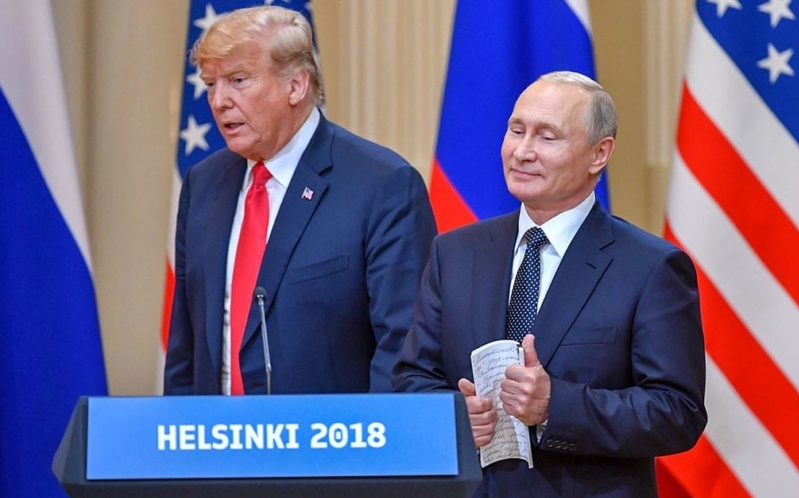Donald Trump and Russian President Vladimir Putin, Helsinki, Finland, July 16, 2018
The Senate Intelligence Committee, with a Republican majority, has confirmed the links between Donald Trump, his 2016 Presidential campaign, and Russian intervention in the US election.
The Republican-majority committee issued its report of almost 1,000 pages on Tuesday. It was published 16 months after the 446-page findings of Special Counsel Robert Mueller set out the cooperation between the Trump campaign and Russia, and evidence of at least eight instances of Trump’s obstruction or attempted obstruction of justice.
See Mueller Report Video: Collusion, Obstruction, and Accountability
Among the Senate committee’s conclusions:
*Russian President Vladimir Putin authorized “an aggressive, multi-faceted effort” to disrupt and undermine the US elections, hoping to sow confusion and prevent a Hillary Clinton Presidency through a Trump victory.
*Russian intelligence agencies targeted Trump campaign officials whom they thought could be easily manipulater — and Trump advisors, with little Government or foreign policy experience were eager for help from Moscow’s officials. They “presented attractive targets for foreign influence, creating notable counterintelligence vulnerabilities”.
One of these targets was George Papadopoulos, a campaign staffer named as one of five “foreign policy advisors” by Trump in March 2016. Trying to set up a meeting between Trump and Putin to boost the campaign, Papadopoulos “was not a witting cooptee of the Russian intelligence services, but nonetheless presented a prime intelligence target and potential vector for malign Russian influence”.
Papadopoulos learned about the Russian operations to influence the election in spring 2016 through meetings in London with Professor Joseph Mifsud, who was linked to Russian agencies.
*While a criminal conspiracy could not be confirmed, there was collusion between the campaign and Russian officials that constituted links with a foreign power and potential US adversary. Trump campaign manager Paul Manafort worked with “Russian intelligence officer” Konstantin Kilimnik, including the provision of Trump campaign strategy and polling data to help Moscow design its operations. That sharing of information “represented a grave counterintelligence threat”.
*Seeking information which could damage Clinton, Donald Trump Jr. met two Russians, Natalia Veselnitskaya and Rinat Akhmetshin, who had “significant connections to Russian government, including the Russian intelligence services”. Manafort and Trump’s son-in-law Jared Kushner were also in the meeting in Trump Tower in June 2016.
The meeting was orchestrated by Aras Agalarov, a Russian billionaire and business associate of Donald Trump and the Trump Organization.
*Trump’s long-time operative Roger Stone — whose 4 1/2-year prison sentence was commuted by Trump last month — worked with WikiLeaks on the publication of e-mails, connected with the Clinton campaigns, which were stolen by the Russians. In one case, the timing was arranged to take attention away from a videotape in which Trump bragged about sexual aggression against women.
While the [Russian military intelligence agency] GRU and WikiLeaks were releasing hacked documents, the Trump Campaign sought to maximize the impact of those leaks to aid Trump’s electoral prospects. Staff on the Trump Campaign sought advance notice about WikiLeaks releases, created messaging strategies to promote and share the materials in anticipation of and following their release, and encouraged further leaks.
*The Russians had an opportunity to compromise Trump from the 1990s because of his multiple sexual relationships with young women, including a former Miss Moscow. While there was no evidence that Trump was compromised, Manafort was because of his financial ties with Russian and Ukrainian oligarchs who connected to Russian intelligence operative Kilimnik.
Manafort had ties with and extensive debts to Oleg Deripaska, a Russian oligarch who was a “proxy” for the Russian State and intelligence services.
Manafort’s briefings to Kilimnik included details about the campaign in the key swing states of Michigan, Wisconsin, Pennsylvania, and Minnesota and the margins by which Trump might win them.
“Manafort conducted influence operations that supported and were a part of Russian active measures campaigns, including those involving political influence and electoral interference,” the report said.
“Manafort conducted influence operations that supported and were a part of Russian active measures campaigns, including those involving political influence and electoral interference,” the report explained.
Collectively, the allegations raised a potential counterintelligence concern, that Russia might use compromising information to influence the then-Presidential candidate’s positions on relations with Russia.
The committee sought, in a limited way, to understand the Russian government’s alleged collection of such information, not only because of the threat of a potential foreign influence operation, but also to explore the possibility of a misinformation operation targeting the integrity of the U.S. political process.
*Additional Russian operations to influence the elections targeted the National Rifle Association, the Republican Party, and conservative US political organizations. They included the operations of Maria Butina, who pleaded guilty to conspiracy to act as an unregistered foreign agent of Russia, and Alexander Torshin, a Putin associate who was deputy governor of the Russian Central Bank.
“Disrupting American Democracy”
In addition to the report’s revelations, a committee letter said Trump campaign advisers may have illegally made false or misleading statements to Congressional investigators.
They included Donald Trump Jr., Kushner, Trump campaign manager and chief strategist Steve Bannon, and campaign co-chairman Sam Clovis.
Committee member Sen. Angus King, an independent, summarized:
The Russians were doing things to disrupt American democracy and help the Trump campaign and the Trump campaign was doing things to amplify and utilize what the Russians were supplying.
There may not have been an explicit agreement but they were both consciously pursing the same end, which was the election of Donald Trump. And for the Russians, the extra benefit was disrupting American democracy.

